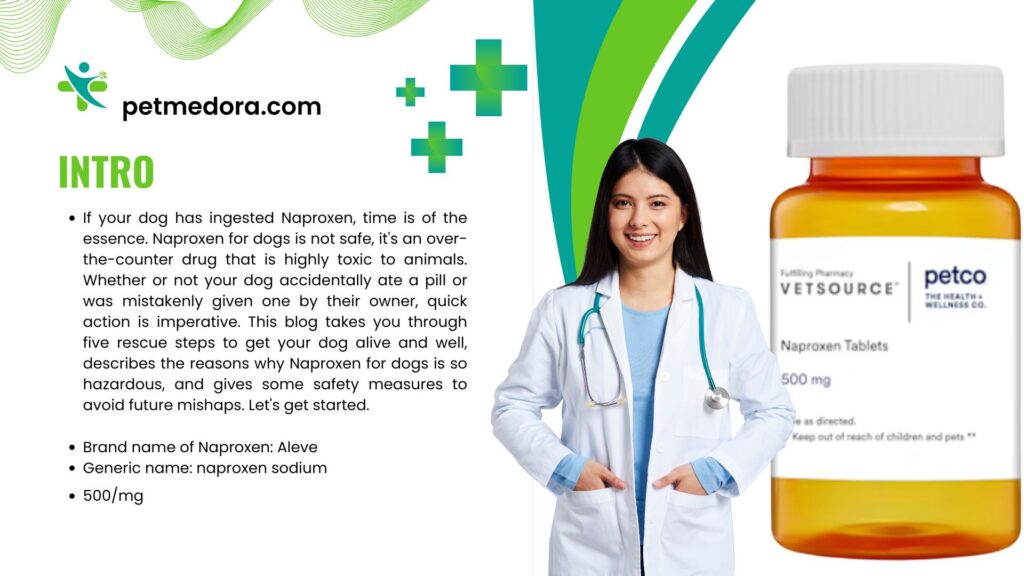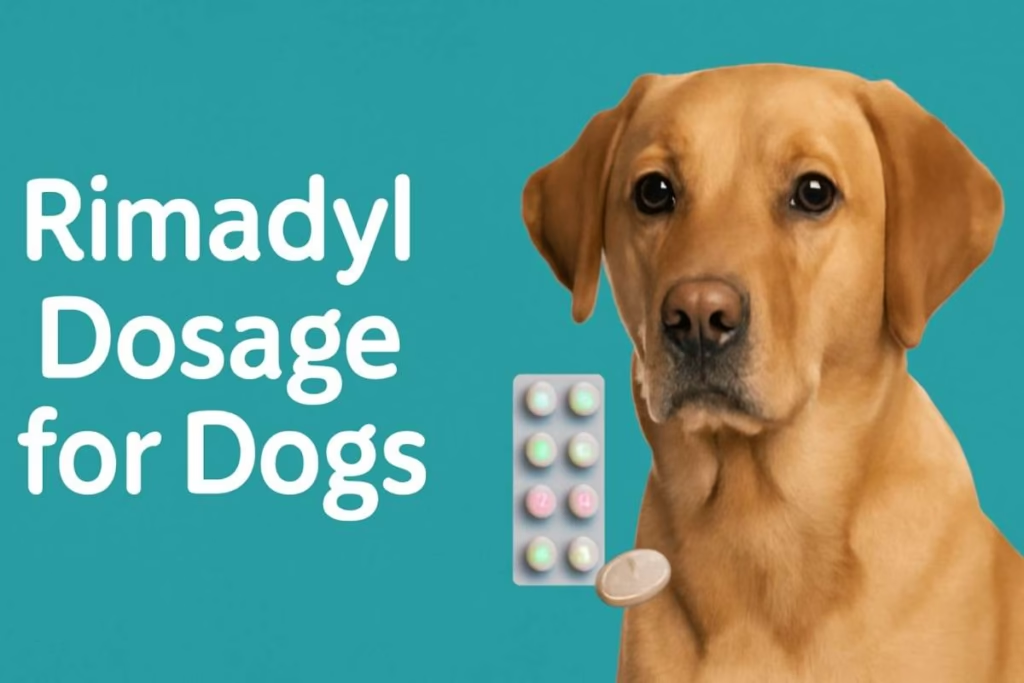What Is Naproxen?
As a pet owner, it’s important to know that naproxen is a nonsteroidal anti-inflammatory drug (NSAID) widely used in humans to address issues like pain, inflammation, and fever. Though naproxen is available under brand names like Aleve and Naprosyn, and even as a generic medication, it is never safe for dogs. The drug is extremely toxic to pets, and it’s vital to keep it out of their reach. Naproxen, though effective for humans, can cause significant harm to your furry friends.
For more details on pain relief medications, see The Ultimate Minocycline for Dogs Dosage Guide.

The Dangers of Naproxen Ingestion in Dogs
When dogs ingest naproxen, the side effects are severe and can be life-threatening. They can experience gastrointestinal ulceration, leading to internal bleeding, anemia from low red blood cells, bloody vomit, or even bloody diarrhea. The situation can escalate quickly, resulting in kidney damage, liver damage, or, in the worst case, death. Even a single over-the-counter Naproxen tablet can cause serious toxicity, especially in larger dogs. The drug has a narrow margin of safety, meaning its potency makes it highly dangerous even in small amounts.Learn more about Naproxen for Dogs: Pros, Cons, and Safe Alternatives.
Immediate Action Is Crucial
If your dog accidentally ingests naproxen, don’t waste time. It’s crucial to contact your veterinarian or an emergency veterinarian immediately. Naproxen poisoning needs swift treatment, and the sooner you act, the better the chance of minimizing harm. I once had to rush a friend’s dog to the clinic after a similar situation, and the vet emphasized how critical immediate action is to prevent lasting damage.
For more about emergency treatment for pets, see Clavamox Dosage for Dogs: How Much is Too Much.
Safer Alternatives for Pain Relief
Here’s the thing—over-the-counter human pain relievers are just not safe for dogs. Thankfully, there are safer, FDA-approved NSAIDs designed specifically for pain relief in pets. Always consult your veterinarian before giving your dog any medication, whether it’s an over-the-counter pain reliever or prescription medication. Medications designed for humans can harm your dog in ways you might not even expect.
For alternatives to NSAIDs, check out Sulfasalazine for Dogs: A Game Changer for Pain Relief.
Uses of Naproxen for Dogs
Naproxen is primarily used to alleviate pain and inflammation in humans, but it’s important to remember that it can be dangerous for dogs. Naproxen has a very narrow safety margin, and while it’s effective for people, it can cause serious harm to pets. If a dog is given this NSAID, it could suffer from gastrointestinal issues, kidney damage, or even more severe health problems. Veterinarians often recommend other safer alternatives for pain relief in dogs, as naproxen is rarely advised due to its toxicity in animals.
Is naproxen safe for dogs?
When it comes to naproxen for dogs, it’s crucial to understand the serious risks associated with its use. Naproxen is not considered safe for dogs, and its consumption can lead to severe digestive system bleeding, kidney problems, and blood disorders.

If your dog has a history of kidney disease, liver disease, or blood disorders, naproxen should be strictly avoided. Additionally, dogs with active stomach ulcers or duodenal ulcers should never be given naproxen, as it can worsen their condition. Even dogs with hypersensitivity to naproxen are at significant risk.For more on the safety of different drugs for pets, see Pregabalin for Dogs: Safe or Dangerous?.As a pet owner, it’s important to consult your veterinarian before considering any medication, as naproxen can do more harm than good.
Key precautions to remember:
- Kidney disease or history of kidney disease
- Liver disease or history of liver disease
- Blood disorders or a history of blood disorders
- Active stomach ulcers or duodenal ulcers
- Hypersensitivity to naproxen
Signs of Naproxen Poisoning in Dogs
Naproxen is a commonly used NSAID for humans, but it’s extremely toxic to dogs. It can cause a range of severe side effects, and if ingested, it’s crucial to act fast. From personal experience, I’ve seen how dangerous it can be when pets accidentally consume naproxen. Here are the key signs to watch out for:
Signs of Naproxen Poisoning in Dogs:
- Vomiting, even bloody
- Diarrhea, even bloody
- Loss of appetite
- Abdominal pain
- Black, tarry stools
- Abnormally low red blood cell levels are associated with internal bleeding
- Elevated kidney levels
- Elevated liver levels
Complications of Naproxen Ingestion in Dogs
Ingesting naproxen can lead to serious complications, including gastrointestinal issues such as vomiting, diarrhea, and abdominal pain. Dogs may also experience renal toxicity, which can be life-threatening. Signs of naproxen poisoning include lethargy, decreased appetite, and gastrointestinal bleeding. If you suspect your dog has ingested naproxen, it is crucial to seek immediate veterinary care or contact an animal poison control center.
Side Effects of Naproxen
While naproxen is generally considered safe and effective when prescribed, it poses a real risk to animals, especially dogs and cats. The therapeutic level of naproxen is dangerously close to the toxic level, meaning it’s rarely recommended for these species. I’ve seen cases where pets with hypersensitivity or allergies to the drug can suffer severe side effects. In addition, pets with kidney, blood, or liver disorders, or pre-existing stomach ulcers, should never be given naproxen.
It’s also essential to be cautious of any potential interactions with other medications like aspirin, NSAIDs, corticosteroids, or furosemide. Common side effects include gastric ulcers and kidney problems, which can be extremely harmful to dogs and cats. Given these risks, many veterinarians will recommend alternative medications for pain relief in pets. For cats, there is no safe dose of naproxen, making it particularly dangerous for them.
How Can I Keep My Dog Safe from Naproxen Poisoning?
- Always ensure human medications are kept away from pets, unless your veterinarian
specifically advises you to give them. - Store all types of medications (including tablets, capsules, ointments, powders, and gels) in places where your pet can’t reach them.
- If you accidentally spill or drop any medications, clean them up right away to stop your pet from ingesting them.
- Never administer any human medications (whether over-the-counter or prescription) or any veterinary drugs meant for another pet to your dog without consulting your veterinarian first.
Interactions of naproxen with other pet meds
Naproxen is highly dangerous for dogs due to their sensitivity to its adverse effects, including kidney damage and gastrointestinal issues. Certain drug interactions can worsen the severity of these side effects. Always consult a veterinarian before giving naproxen to your dog, as safer alternatives are available.
Naproxen Dosage for Dogs
Naproxen is a nonsteroidal anti-inflammatory drug (NSAID) commonly used in humans to relieve pain and inflammation. However, its use in dogs is highly discouraged due to the potential for severe side effects and toxicity. The dosage of naproxen for dogs has not been established as safe or effective, and veterinarians do not recommend giving naproxen to pets.
Dosing Information of Naproxen for Dogs
- Always consult your veterinarian before giving any medication.
- The dose for dogs is typically 0.5 to 1.5 mg per pound (1 to 3 mg/kg) once daily.
- Many veterinarians prefer safer NSAIDs that are more effective for dogs.
- Naproxen is NOT RECOMMENDED FOR USE IN CATS.
- The duration of administration depends on the condition, the pet’s response, and potential adverse effects.
- Complete the prescription as directed by your veterinarian, even if your pet feels better, to prevent relapse.
Best Alternatives to Naproxen for Dogs:
- NSAIDs specifically formulated for dogs
- Corticosteroids prescribed by your veterinarian
- Opioid analgesics for severe pain, with professional guidance
- Acetaminophen-free pain relief solutions for pets
- Herbal and natural remedies approved by your vet for mild pain
Safe Alternatives for Pain Management in Dogs
For pain management in dogs, veterinarians may prescribe other FDA-approved NSAIDs that have been specifically formulated for canine use. These medications are designed with a narrower margin of safety and are closely monitored for any adverse effects. Always consult your veterinarian before administering any medication to your dog, including over-the-counter drugs like naproxen or ibuprofen.
For more alternatives for dog pain relief, see Rimadyl Dosage for Dogs.
Can dogs overdose on naproxen?
When it comes to naproxen for dogs, it’s crucial to understand how easily they can overdose on this medication. Unlike humans, dogs are more sensitive to its effects, and an overdose can cause serious damage, including renal damage, liver damage, and even anemia. I’ve witnessed situations where pet owners unknowingly gave their dogs human-formulated naproxen over several days, not realizing the potential harm.
Because dogs eliminate naproxen much more slowly than humans, it builds up in the body, especially in smaller animals, which makes the toxicity more dangerous. Adverse effects can escalate quickly and become life-threatening, showing symptoms such as vomiting, diarrhea, and blood in the vomit. In more severe cases, dogs may experience black and tarry stools (melena) and neurological issues like depression, weakness, and seizures.
If your dog shows any signs of naproxen poisoning, immediate action is needed:
- Vomiting
- Diarrhea
- Blood in the vomit
- Black, tarry stools (melena)
- Depression
- Weakness
- Sleepiness
- Seizures
Summry:
Naproxen is unsafe for dogs due to its toxicity, potentially causing gastrointestinal issues, renal toxicity, and gastrointestinal bleeding. If ingested, it can be life-threatening, and immediate veterinary care is essential. Veterinarians recommend safer, FDA-approved NSAIDs specifically designed for dogs. Always consult with your vet before giving any medication to your pet.


